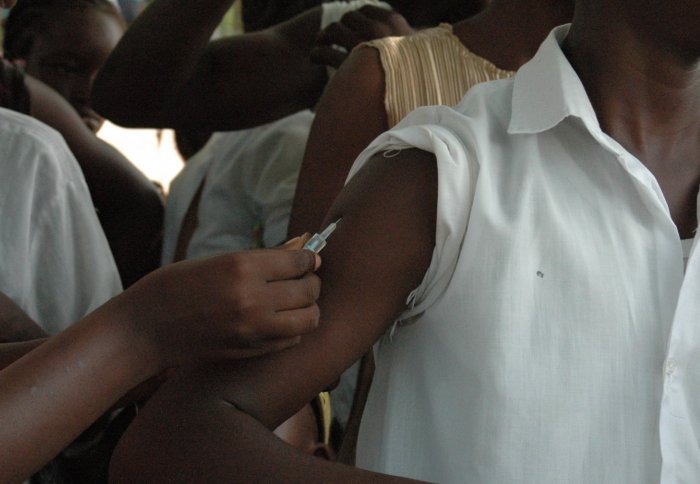Mass vaccination campaigns reduce the burden of yellow fever in Africa

Yellow Fever Vaccination Campaign in Africa
New research has estimated that recent mass vaccination campaigns decreased the burden of yellow fever by 27 per cent across Africa in 2013.
Yellow fever is an acute viral disease, transmitted by mosquitoes, that affects people living in and visiting tropical regions of Africa and Central and South America. In rural areas next to forests, the virus typically causes sporadic cases or even small-scale epidemics but if it is introduced into urban areas, it can cause large explosive epidemics that are hard to control.
Although many people who contract yellow fever do not develop any symptoms, some have mild flu-like symptoms, and others develop a high fever with jaundice or hemorrhaging from the mouth, nose, eyes, or stomach. About 50 per cent of patients who develop these severe symptoms die. Fortunately, an effective vaccine against the disease exists.
In a study published this week in PLOS Medicine, researchers led by Professor Neil Ferguson from the School of Public Health at Imperial College London estimate that yellow fever was responsible for 78,000 deaths in Africa in 2013.
Current mass vaccination campaigns have already achieved excellent results in reducing the cases of yellow fever and deaths from this disease.
– Dr Tini Garske
Research Associate
The research also estimates that recent mass vaccination campaigns against yellow fever, from 2006 to 2012, have led to a 27 per cent decrease in the number of cases of yellow fever and deaths from this disease across Africa in 2013.
The study provides the most reliable contemporary estimates for the burden of yellow fever and the impact of vaccination campaigns in Africa. Partly as a result of the researchers’ estimates, the GAVI Alliance Board (a public-private global health partnership committed to increasing access to immunisation in poor countries), offered support for additional yellow fever vaccination campaigns in late 2013, targeting 144 million people across the endemic region in Africa.
The researchers conclude that the impact of both past and future mass vaccination campaigns will prevent a substantial proportion of yellow fever disease burden for years to come.
Co-author of the study Dr Tini Garske from the School of Public Health Imperial College London said: “Yellow Fever is still a huge problem in parts of Africa and fortunately we have an effective vaccine. Current mass vaccination campaigns have already achieved excellent results in reducing the cases of yellow fever and deaths from this disease. These results could be sustained if a high level of immunization is reached through a strong infant immunization program and preventive vaccination of populations that remain at-risk, such as migrants or populations from as yet unvaccinated districts.”
The study applied sophisticated statistical methods to estimate the burden of yellow fever in Africa based on outbreak data, serological surveys (analysis of samples of bodily fluids which have been taken for other medical reasons) and environmental data. The researchers note that there is substantial uncertainty in their estimates because of the difficulty of diagnosing yellow fever and a lack of available data. As such the estimates for the number of severe cases of yellow fever in Africa in 2013 range from 51,000 to 380,000, and from 19,000 to 180,000 for deaths due to the disease.
Reference: Garske et al. ‘Yellow Fever in Africa:Estimating the Burden of Disease and Impact of Mass Vaccination from Outbreak and Serological Data’ PLOS Medicine (2014) http://www.plosmedicine.org/article/info%3Adoi%2F10.1371%2Fjournal.pmed.1001638
Article supporters
Article text (excluding photos or graphics) © Imperial College London.
Photos and graphics subject to third party copyright used with permission or © Imperial College London.
Reporter
Franca Davenport
Communications and Public Affairs